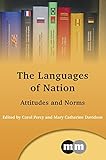TheLanguages of Nation : Attitudes and Norms / ed. by Carol Percy, Mary Catherine Davidson.
Material type: TextSeries: Multilingual MattersPublisher: Bristol ; Blue Ridge Summit : Multilingual Matters, [2012]Copyright date: ©2012Description: 1 online resource (304 p.)Content type:
TextSeries: Multilingual MattersPublisher: Bristol ; Blue Ridge Summit : Multilingual Matters, [2012]Copyright date: ©2012Description: 1 online resource (304 p.)Content type: - 9781847697806
- 9781847697813
- Education, Bilingual -- Cross-cultural studies
- Education, Bilingual -- Cross-cultural studies
- Linguistic minorities -- Cross-cultural studies -- Education -- Social aspects
- Linguistic minorities -- Education -- Social aspects -- Cross-cultural studies
- Multicultural education -- Cross-cultural studies
- Multicultural education -- Cross-cultural studies
- LANGUAGE ARTS & DISCIPLINES / Study & Teaching
- 306.44089 23
- P119.315 .L364 2012
- P119.315 .L364 2012eb
- online - DeGruyter
| Item type | Current library | Call number | URL | Status | Notes | Barcode | |
|---|---|---|---|---|---|---|---|
 eBook
eBook
|
Biblioteca "Angelicum" Pont. Univ. S.Tommaso d'Aquino Nuvola online | online - DeGruyter (Browse shelf(Opens below)) | Online access | Not for loan (Accesso limitato) | Accesso per gli utenti autorizzati / Access for authorized users | (dgr)9781847697813 |
Frontmatter -- Contents -- Acknowledgements -- Contributors -- 1. Introduction: Multidisciplinary and Multilingual Perspectives on ‘Patriotic’ Prescriptivism -- 2. Foreword: Language, Prescriptivism, Nationalism – and Identity -- Part 1: Managing Language Policies -- 3. William Cecil and the Rectification of English -- 4. Prescribing Pastoral and Pragmatic Orientations: Challenges for Language Policy -- Part 2: Colonialism and Literary Canons -- 5. Mutual Preservation of Standard Language and National Identity in Early Modern Wales -- 6. ‘A Highly Poetical Language’? Scots, Burns, Patriotism and Evaluative Language in 19th-century Literary Reviews and Articles -- Part 3: Transmarine and Transatlantic Allegiances -- 7. Language and National Identity in 17th- and 18th-century England -- 8. ‘À la Mode de Paris’: Linguistic Patriotism and Francophobia in 18th-century Britain -- 9. Pronouncing Dictionaries between Patriotism and Prescriptivism: Perspectives on Provincialism in Webster’s America -- Part 4: Re-defining Boundaries: Ideology and Language Norms -- 10. Patriotism, Empire and Cultural Prescriptivism: Images of Anglicity in the OED -- 11. You Say Nucular; I Say Yourstupid: Popular Prescriptivism in the Politics of the United States -- Part 5: Identifying Norms and Attitudes in Postcolonial Contexts -- 12. English and Pidgin in Cameroon: Peaceful or Conflicting Coexistence? -- 13. Susu not Sousou: Nationalism, Prescriptivism and Etymology in a Postcolonial Creole Language Orthography -- Part 6: Prescribing Norms Beyond Borders: Foreign Language Teaching -- 14. Rules for the Neighbours: Prescriptions of the German Language for British Learners -- 15. Nativeness, Authority, Authenticity: The Construction of Belonging and Exclusion in Debates about English Language Proficiency and Immigration in Britain -- Index
restricted access online access with authorization star
http://purl.org/coar/access_right/c_16ec
This collection brings together research on linguistic prescriptivism and social identities, in specific contemporary and historical contexts of cross-cultural contact and awareness. Providing multilingual and multidisciplinary perspectives from language studies, lexicography, literature, and cultural studies, our contributors relate language norms to frameworks of identity beyond monolingual citizenship - nativeness, ethnicity, politics, religion, empire. Some chapters focus on traditional instruments of prescriptivism: language academies in Europe; government language planners in southeast Asia; dictionaries and grammars from Early Modern and imperial Britain, republican America, the postcolonial Caribbean, and modern Germany. Other chapters consider the roles of scholars in prescriptivism, as well as the more informal and populist mechanisms of enforcement expressed in newspapers. With a thematic introduction articulating links between its breadth of perspectives, this accessible book should engage everyone concerned with language norms.
Mode of access: Internet via World Wide Web.
In English.
Description based on online resource; title from PDF title page (publisher's Web site, viewed 01. Dez 2022)


